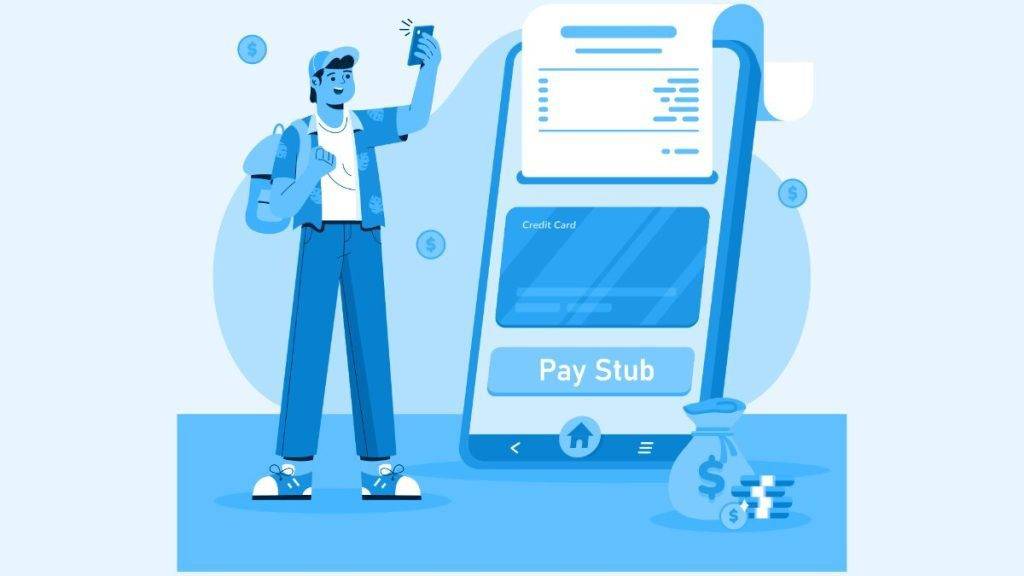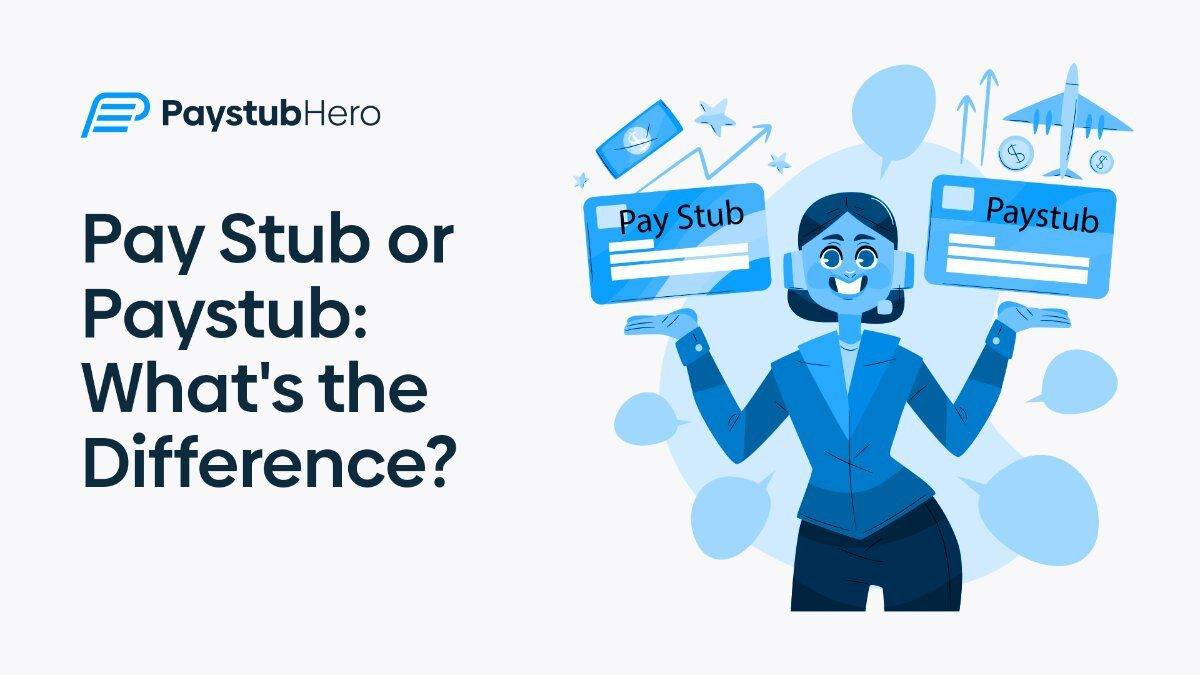There’s no difference between “pay stub” and “paystub.” They both refer to the same document: a detailed breakdown of your earnings and deductions for a specific pay period.
However, “Pay stub” is the more common spelling, but “paystub” is a less frequent variation. Both are perfectly acceptable.
This article focuses on pay stubs, explaining what they contain and the benefits they provide. It also explores how you can create them yourself. Read on.
What is a Pay Stub?

As seen above, a pay stub, or pay slip, is a document from your employer showing your earnings for a specific pay period.
It breaks down your paycheck, showing your gross pay, which is your earnings before taxes and deductions. Then, it lists the deductions and shows your net pay, which is the amount you actually receive.
Also Read: Gross vs Net Income – Understanding your Paystub
Essential Elements of a Pay Stub
Below are the key components that constitute a comprehensive pay stub.
General Information
At the top of every pay stub, you’ll find the general information. This includes:
• Employer’s info: This includes their name and address, so you know exactly which company is cutting you the check.
• Your info: Your name and address ensure the money goes to the right person.
• Your ID number: This is usually your Social Security number, but it could be another ID number. It helps the employer track your earnings for tax purposes.
Pay Period and Year-to-Date (YTD)
The pay period section on your pay stub shows the exact dates you worked for in that paycheck. It can be weekly, bi-weekly, twice a month (semi-monthly), or monthly, depending on your company’s schedule.
This way, you know exactly how much time you clocked in for.
Also Read: How Do Pay Periods Work
YTD earnings, on the other hand, stand for “year-to-date” earnings. This is the total amount of money you’ve made so far in the year up to your current pay period.
Keeping track of this number is important because it helps you understand how much you’ve earned overall. Additionally, it shows how much you might owe in taxes come tax season.
Gross Wages
Gross wages are an employee’s total money before any taxes or deductions are withheld.
Here’s a breakdown of what gets included:
• Regular Wages:
This is the core of your earnings, calculated based on your employment agreement. It can be:
1. Hourly Rate: If you’re paid by the hour, your regular wages are simply the number of hours worked multiplied by your hourly rate.
2. Salary: If you receive a fixed amount per pay period (usually bi-weekly or monthly), that’s your regular salary.
Also Read: Salary vs Hourly – Which is best?
• Overtime:
When you work beyond the standard work hours as defined by law (often 40 hours per week), you’re entitled to overtime pay. This is typically calculated at a higher rate than your regular pay, often 1.5 times your hourly rate.
• Bonuses:
These are performance-based or company-driven incentives paid on top of your regular wages. They can be a fixed amount, a percentage of sales, or a combination of both.
• Commissions:
Earnings directly tied to your sales or production achievements. The commission rate is a percentage of the total value you bring to the company.
• Other Compensatory Payments:
This category can include reimbursements for work-related expenses like travel, meals, or uniform cleaning.
Example Calculation
Let’s say you’re an hourly worker earning $15 per hour and worked 40 regular hours during the pay period. You also worked 8 hours of overtime (at 1.5x your rate) and received a $100 performance bonus.
Here’s how your gross wages would be calculated:
• Regular Wages: 40 hours x $15/hour = $600
• Overtime: 8 hours x ($15/hour x 1.5) = $180
• Bonus: $100
Total Gross Wages: $600 (Regular) + $180 (Overtime) + $100 (Bonus) = $880
Deductions
When you get paid, your employer takes out some money before you see it. This is what those deductions are all about.
There are two main types of deductions:
• Required taxes:
The government takes a portion of your paycheck to pay for things like roads and schools. This includes federal income tax (based on your filing status, which says who you can claim on your taxes) and state income tax (which varies by state).
There are also Social Security and Medicare, which are insurance programs for retirees and people with disabilities.
• Benefits:
You might also choose to pay for some benefits with your paycheck. This could be money going into your retirement savings plan, like a 401k.
It might also be used to pay for health insurance to cover medical bills.
Net Pay
After all deductions are removed, the net pay is the remaining amount. This is the actual take-home pay you receive. It’s your gross wages minus all deductions and is the final amount that goes into your bank account or is issued as a check.
Net pay is the most anticipated number on the pay stub since it represents the money available for personal use.
Benefits of a Pay Stub

Here are four key benefits of understanding your pay stub:
1. Verifying Accuracy
By comparing your pay stub to your work schedule and pay rate, you can ensure you’re being compensated fairly. If you see any differences, you can tell your employer to fix them.
2. Budgeting and Tracking
Understanding your net pay (take-home pay) is crucial for creating a budget. Your pay stub shows exactly how much money you have coming in each pay period. It displays your earnings after taxes and deductions are withheld.
This information is essential for planning your expenses and managing your finances effectively.
3. Proof of Income
Landlords, lenders, and even government agencies may require proof of income when you apply for a rental property, loan, or benefit program.
Your pay stub serves as a credible source of documentation for your income level.
4. Tax Preparation
During tax season, your pay stubs become important references for filing your tax return. The information on your pay stubs, such as total income and pre-taxed deductions, helps you determine your tax liability.
This helps you claim any applicable tax credits or deductions.
Create Your Pay Stubs With Paystub Hero!
If you need to create professional pay stubs for your business or personal use, try Paystub Hero. Our online platform lets you generate professional and accurate pay stubs in minutes.
Here’s why Paystub Hero is perfect for you:
• Effortless Customization: Our easy-to-use platform allows you to quickly enter your employee information, earnings, deductions, and more.
• Guaranteed Accuracy: Paystub Hero automates calculations, ensuring your pay stubs are always precise.
• Instant Downloads: No waiting! Generate and download professional-looking pay stubs in just a few clicks.
Get your accurate pay stubs today!
FAQs
Here are the most frequently asked questions about pay stubs.
What is the meaning of pay stubs?
A pay stub is a document that shows your earnings for a specific pay period. It details your gross pay and subtracts any taxes, insurance, or other withholdings to show your net pay (take-home pay).
How do I find my pay stubs?
If you receive a paper paycheck, the pay stub might be attached to it. Otherwise, most employers provide electronic access to pay stubs through an online payroll portal. You can find it on your employer’s website or a dedicated employee portal.
If you’re unsure, reach out to your HR department.
How to create pay stubs?
You can use Paystub Hero to generate your pay stubs.
What is a synonym for pay stub?
A pay stub can be described using different words, such as payslip, paycheck stub, earnings statement, or salary slip.








